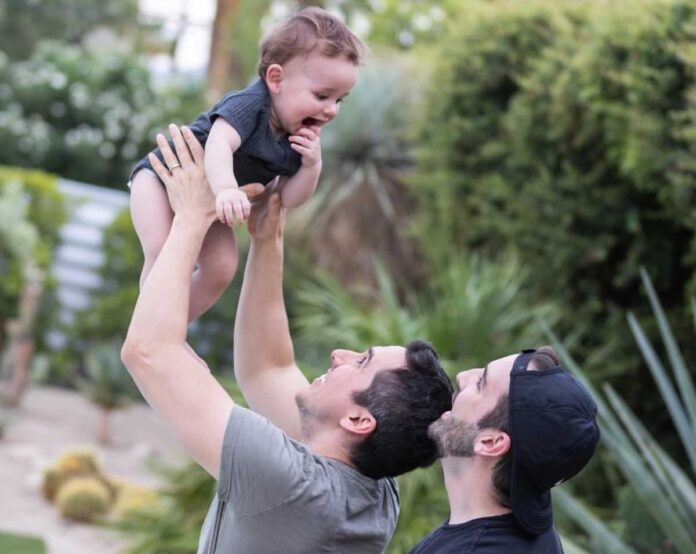
Men Having Babies (MHB) is an organization created for same-gender male couples, single men and trans women who want to start a family via surrogacy. It began as a concept in 2005, when current MHB Executive Director Ron Poole-Dayan started running an information group and annual seminar out of a New York LGBT center for gay men who wanted to start biological families. As men “graduated” from the program and had children, they began helping Poole-Dayan run the meetings. From there, the group collectively started MHB as a nonprofit organization in 2012.
“We identified a void,” Poole-Dayan said. For men who wanted to go start a family via surrogacy, “we had very few resources or advice at the time.”
Poole-Dayan cited the ability to afford all of the services involved in surrogacy as one of the biggest hurdles for men having babies. When representatives from agencies and clinics came to speak at the pre-MHB events, Poole-Dayan and his collaborators would ask why their services are so expensive and what could be done to lessen the cost.
“We realized this has to come from us,” he said. “The original idea was very Robin Hood-y. How come if agencies and clinics in growing numbers are now interested in coming and using our events to reach our potential clients, why don’t we charge them for that? And we’ll give this money to people who can’t afford it.”
The services the organization offers include providing financial assistance, helping couples connect with a surrogate and egg donor, hire lawyers, access books and research on the surrogacy process and much more. Since 2014, MHB has helped over 500 couples in almost every U.S. state and across 14 countries.
Poole-Dayan and his husband have 21-year-old boy-girl twins that they had via surrogacy. They are two of the first children in the U.S. to be born via gestational surrogacy, meaning the couple used an egg donor and connected with a third party who carried the babies. Decades ago, most gay couples underwent traditional surrogacies, where the surrogate would use her own egg and carry the baby. These days, virtually all surrogacies are gestational surrogacies, Poole-Dayan said.
Parents-to-be who wish to obtain financial assistance through MHB’s Gay Parenting Assistance Program (GPAP) must meet certain eligibility requirements, including undergoing a criminal background check, proving that they have lived with their partner for at least two years following marriage and adhering to other paremeters. Once a client is deemed eligible, GPAP offers discounted and free services donated from over 100 IVF, surrogacy, egg donation and legal service providers, as well as reduced cost and free services like fertility medication and insurance resources. Cash grants are given to parents who have been approved through stage two of GPAP, which requires more advanced criteria like passing a psycho-social evaluation and showing a financial statement of assets.
“[MHB] let us have a family — I don’t think we could be more thankful than we are for that,” a former participant of GPAP said in a video on the organization’s website.
In addition to financial assistance with the surrogacy process, MHB offers access to support groups related to birth and delivery, academic books and articles about surrogacy before, during and after the process, peer advising, blogs, as well as an annual conference. Conference speakers include men who started families through surrogacy, surrogates, children who were born via surrogacy, children of surrogates, experts in a particular aspect of surrogacy, lawyers and others.
As part of a past conference panel that addresses some of the issues that arise in surrogacy processes, Poole-Dayan brought up a frequently asked question that surrogates get: how they could possibly give up a child.
“When people are asking that question, they’re not really looking at the process from the beginning of it,” Lisa Schuster, director of programming for MHB and former gestational surrogate, said in a video recording of the conference. “It’s really not me giving up my child, it’s me at the very beginning making the decision to become a surrogate, and knowing throughout that entire process — which pregnancy is really only a part of that process — that it’s not my baby, it was never intended to be my baby, it never had the possibility of being my baby.”
As part of the organization’s wide-ranging advocacy work, MHB leaders are organizing a coalition to fight some of the legal roadblocks to fertility equality. One such barrier: tax regulations that apply to fertility health. At the moment, gay male couples planning to start a family cannot legally deduct any of their surrogacy-related medical costs from their taxes, nor can they have their insurance cover surrogacy-related health costs.
“Now they can in Illinois because of a bill that we pushed that for the first time defines infertility as not just a disease or a condition but also a status,” Poole-Dayan said. “It allows [gay men] to benefit from the same IVF benefits as a heterosexual couple with medical indications for diseases or conditions.”
Similar bills are awaiting passage in Washington and California, and hopefully New York, Poole-Dayan said.
“New York was one of the last places where you can do surrogacy legally,” he said. “But it’s not enough to tell people you can do surrogacy legally, you need to be able to afford it. We’re not asking taxpayers to pay for the surrogate compensation, but why can’t I use my health savings account, which I can’t right now.”
